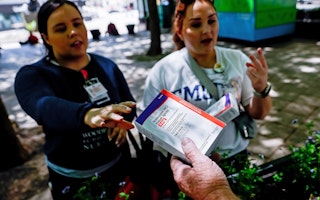Three Ways to Stop Overdose Deaths Now
By Jamie Wood
Glee star Cory Monteith died tragically after overdosing on a combination of alcohol and heroin. He had a history of substance use problems and fought to get help at two different points in his life. In the end, he lost his battle with addiction.
Overdoses like Monteith’s happen far too often. They are part of a growing trend in the United States; almost 40,000 people died from overdose in 2010 alone—more than died in car accidents—according to the Centers for Disease Control.
We need to reverse this trend. One way to do this is by reforming U.S. drug policies. As a nation, we need to rethink the way we deal with people who use drugs.
Three concepts deserve our collective attention when thinking about how best to respond to substance use:
Understanding Addiction, Pain, and Mental Health
Addiction is a chronic illness and should be treated as such, rather than being punished or condemned. Dr. Gabor Mate has worked extensively with people who suffer from substance use disorders. He eloquently describes the root causes and life experiences that underlie addiction. In his book In the Realm of Hungry Ghosts: Close Encounters with Addiction, he writes:
Not all addictions are rooted in abuse or trauma, but I do believe they can all be traced to painful experience. A hurt is at the center of all addictive behaviors. It is present in the gambler, the Internet addict, the compulsive shopper and the workaholic. The wound may not be as deep and the ache not as excruciating, and it may even be entirely hidden—but it’s there.... [T]he effects of early stress or adverse experiences directly shape both the psychology and the neurobiology of addiction in the brain.
Naloxone and Preventing Overdose Death
Naloxone is an antidote to opioid overdose, administered as a nasal spray or as an injection. As with EpiPens in the treatment of allergic reactions, anyone can learn to administer naloxone. One might argue that the ideal scenario would be to avoid overdose altogether, but that is little comfort to the parents and children who have lost their loved ones to overdose. What naloxone provides, when used correctly, is another chance for the person suffering from addiction to survive and seek help.
Earlier this year, Time magazine reported that broader use of naloxone could reduce overdose deaths by 50 percent. Any place frequented by people who use opioids, like needle exchange programs, hotels, and college dorms, should have naloxone available.
Good Samaritan Laws
No one should be punished for making a 911 call on behalf of someone who is overdosing. 911 Good Samaritan laws grant limited immunity from some drug charges to people experiencing an overdose and to witnesses who seek help.
A piece in the Huffington Post describes how the death of 24-year-old Greg Humes could have been avoided if his friends had called for help instead of abandoning him in a hospital parking lot. In life or death situations, the risk of punishment should never stop us from calling for help.
When asked what he would do after Glee ended, Monteith said he would try to “shed light on the way out of a difficult situation that I know many kids are experiencing, just like I did when I was a teenager.” A tribute to Monteith’s spirit would be to increase awareness about the root causes of addiction, develop a broader set of tools to respond to addiction and overdose, expand access to naloxone, and in doing so, prevent other tragic deaths.
Jamie Wood is senior program manager, states, with the Open Society-U.S.


